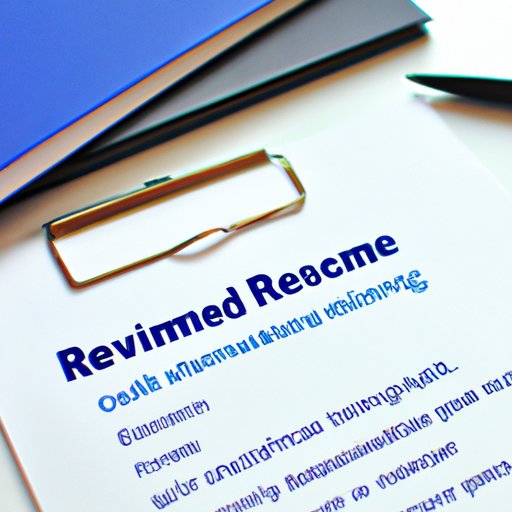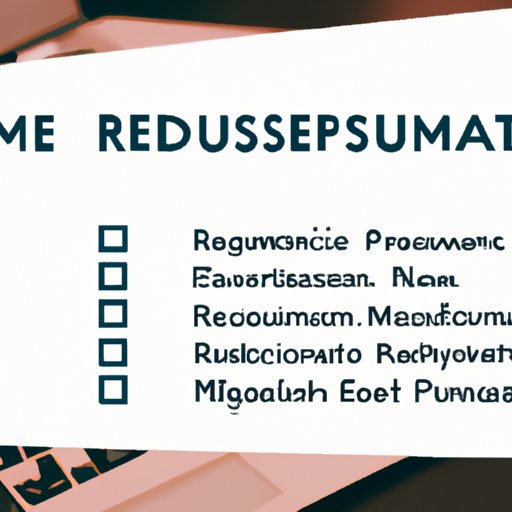
Introduction
One of the essential sections of a resume is the education section. It is a quick snapshot of your academic background and accomplishments. However, listing your education can be tricky, and it needs to be done correctly to showcase your strengths and qualifications to potential employers. This article will cover everything you need to know to put education on your resume effectively.
10 Tips for Listing Education on Your Resume: Streamline Your Education Section and Stand Out to Employers
When putting education on your resume, there are some essential tips to keep in mind:
Make sure your education section is relevant to the job you’re applying for
Highlight your relevant academic background that aligns with the job description and requirements. For example, if you’re applying for a job in marketing, list your marketing degree first, followed by other relevant degrees.
Decide on the order in which you list your education
The order of your education section is essential. You can mention it in reverse-chronological order or chronological order, depending on which style the employer prefers.
Keep it concise and relevant
Summarize your education in bullet points that are concise, relevant, and easy to read. Avoid long descriptive paragraphs.
Avoid listing irrelevant or incomplete education
Include only the most relevant degrees, certificates, or programs. If your education is incomplete, such as unfinished coursework, avoid listing it.
Include any relevant certifications or licenses
Include any credentials or licenses relevant to the job you’re applying for, such as CPA, CFA, PMP, or CFP. This can add value to your application.
List any education-related honors or awards
Listing academic honors, scholarships, or awards such as cum laude, magna cum laude, or summa cum laude, can reinforce your academic achievements.
Make sure your degree is properly listed
Include the degree title, major, minor, the name of the university, and the date of graduation.
Add relevant coursework if it pertains to the job you’re applying for
If you’ve taken courses or completed projects related to the job you’re applying for, it can demonstrate your knowledge and skills and provide more context for your academic background.
Don’t exaggerate or lie about your education
Always be honest about your education, as exaggerating or misrepresenting your academic background can lead to termination or legal issues.
Use keywords and phrases related to your education
Using relevant keywords and phrases in your education section can help your application reach the employer’s desk and pass automated screening.
Making Your Education Section Shine: Best Practices for Resumes
Here are some best practices to make your education section stand out:
Use proper formatting and templates
Use a clean and professional resume template and proper formatting to make your education section readable.
Incorporate white space and proper margins
Use white space in your resume design to make the content more readable. Maintain proper margins, so your education section doesn’t look cramped or cluttered.
Use bullet points to make the section clear and concise
Use bullet points to make your education section easy to read and concise.
Use proper grammar and spelling
Grammatical errors or misspelled words can make you look unprofessional. Always proofread your resume for accuracy.
Use strong action words when describing your education
Use powerful action words to describe your academic background and accomplishments. Words like completed, exceeded, mastered, achieved, or led can make your education section more impactful.
Use parallelism and consistency in listing your education
Using a consistent format and parallel structure in all your education entries can make your resume look more polished and organized.
From GPA to Coursework: Expert Advice on Highlighting Your Education on a Resume
Here are some expert tips for highlighting your education on your resume:
Tips for listing GPA (if applicable)
If your GPA is 3.0 or above, consider listing it on your resume. If your GPA is lower than 3.0, don’t include it. You can also mention your GPA only if it strengthens your qualifications.
How to mention academic honors, such as cum laude, or summa cum laude
If you’ve graduated with honors or received any academic distinction, include it in your education section. Be sure to list the correct Latin honor, such as cum laude, magna cum laude, or summa cum laude.
How to list study abroad experiences
If you’ve studied abroad, mention it in your education section. Listing your academic-rich experience abroad can demonstrate your skill adaptability, critical thinking, and cross-cultural competence.
Tips for listing relevant coursework
If you’ve completed any relevant coursework with good grades, mention it. This can demonstrate your skillset and knowledge in the field.
How to list relevant research projects or independent studies
If you’ve conducted any academic research or completed independent studies relevant to the job, consider mentioning them.
Education Matters: Incorporating Your Academic Achievements on Your Resume
Here are some ways to incorporate academic achievements on your resume:
How including academic achievements can make your resume stand out
Academic achievements can demonstrate your academic accomplishments, skills, and work ethic. It can make you stand out from other candidates who have the same degrees.
Highlighting specific academic projects or publications
If you’ve worked on any academic projects or publications related to your field, include them in your education section.
Listing academic extracurricular activities
Mentioning any academic extracurricular activities can showcase your leadership skills, team spirit, and community involvement.
How to mention specialized certifications and qualifications
If you’ve earned any specialized certifications or qualifications related to the job, such as CPA, CFA, or PMP, mention them in a dedicated section.

Maximizing the Impact of Your Education: How to Properly Display Your Academic Background on Your Resume
Here are some other ways to maximize the impact of your education section:
How to tailor your education section to match the job description
It’s essential to tailor your education section to match the job requirements and description. Highlighting your specific academic strengths that align with the job can make your application more attractive.
Ideas for effective wording on your resume
Using effective wording can help showcase your academic background and accomplishments in the best light possible.
Tips for using quantifiable achievements in your education section
Listing quantifiable achievements, such as scholarships or grants awarded, can make your accomplishments stand out.
How to use bullet points to highlight your academic accomplishments
Bullet points can highlight your academic accomplishments, making it easy to scan for the employer.
Why Your Education is Essential on Your Resume and How to Include It Effectively
Here are a few reasons why education is essential to list on your resume:
Explanation of why including education is important for employers
Education is an essential criterion that hiring managers look for while assessing candidate applications. It provides insight into your academic background, skills, and achievements.
The benefits of emphasizing your academic background
When you emphasize your academic background, it shows employers that you have the experience and knowledge to meet the requirements of the job consistently.
Tips for incorporating education in your objective statement or summary section
You can incorporate your education in your objective statement or summary section. It provides a quick snapshot of your qualification to the employer.
How to ensure that your education section is a strong reflection of your qualifications
You can ensure that your education section is a strong reflection of your qualifications by following the tips and advice discussed in this article.
Conclusion
As shown, your education section plays a crucial role in showcasing your academic background, achievements, and skills. By following the tips and best practices outlined in this article, you can create a compelling education section that accurately represents your qualifications. Make sure your education section is well-formatted, concise, and relevant to the job you’re applying for. Remember, honesty is the best policy, so never exaggerate or misrepresent your academic background or achievements.




